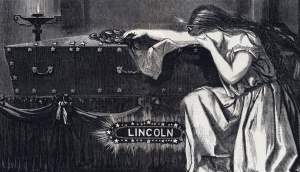Record Data
Source citation
"The Great Calamity," Chicago Tribune, April 17, 1865, p. 2
Type
Newspaper
Date Certainty
Exact
Transcriber
John Osborne, Dickinson College
Transcription date
Transcription
The following text is presented here in complete form, as it originally appeared in print. Spelling and typographical errors have been preserved as in the original.
THE GREAT CALAMITY
The most horrid crime ever committed on this globe, since the wicked Jews crucified the Savior of mankind, was perpetuated by rebel emissaries, in the assassination of the great, wise, and good Abraham Lincoln, and by a strange coincidence the murder was committed on the anniversary of Christ's death. On good Friday the Savior expiated the sins of the world by a death on the cross, and the same day the greatest and best of living men was assassinated.
The foolish rebels have killed their best friend. The man who stood between them and retribution, who alone had the skill and power to shield them from the punishment their crimes deserve, is slain by them. President Lincoln has mourned over the rebellious conduct of the insurgents as a father mourns over the conduct of an erring child. His heart bled for them. He sought to allure them back to the path of loyalty by excessive kindness and parental forgiveness. He never touched the hair of one of their guilty heads, but with sorrow and reluctance. He was preparing for them the feast of the Prodigal son. He was ready to welcome them back, and kill the fatted calf for their entertainment.
No man but Abraham Lincoln could restrain the American people from visiting righteous wrath upon the heads of the wicked leaders of the accursed rebellion. No living man possessed the confidence and affection of the people and army as he. To the judgment of no other man would they defer so cheerfully and willingly. He possessed a marvelous power over the minds of the people; they reposed unlimited faith in his sagacity, integrity, honesty and soundness of judgment. He could do almost whatever he pleased, because he never abused the confidence of the people, never betrayed their trust - because he was solely actuated by a sense of duty and patriotism. He ever tried to do what he conscientiously believed to be right. Right was his polar star; conscience was his monitor, and he tempered all his dealings with the rebels with forbearance and mercy. He harbored no particle of animosity. He never felt the sensation of revenge in his life; he never hated a human being. His millions of admirers and friends found but one fault, and that was with his excess of lenity and kindness toward public enemies. It made his heart bleed to sign the death warrant of the worst guerilla assassin or rebel spy; - he thought no evil; he wished no human being harm; he was the embodiment of Christian precepts and virtues. The Chair of State, made vacant by his death, there is none in the land - no, not one, able to fill it as he filled it. An age produces but one Washington. Abraham Lincoln was the Washington of this generation - the second Father of his Country. In his untimely death a heavy calamity has fallen upon the American people.


